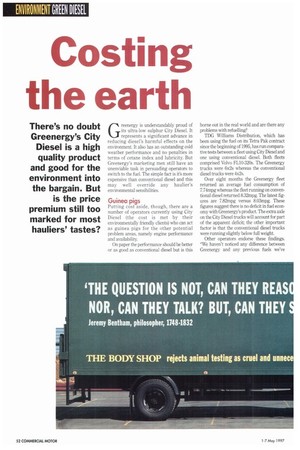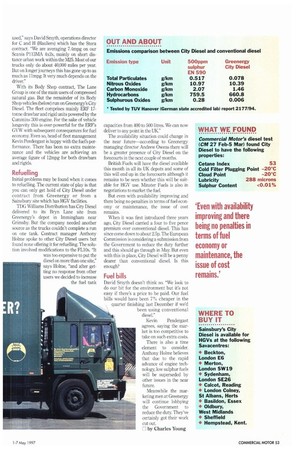Costing the earth
Page 54

Page 55

If you've noticed an error in this article please click here to report it so we can fix it.
There's no doubt Greenergy's City Diesel is a high quality product and good for the environment into the bargain. But is the price premium still too marked for most hauliers' tastes?
Greenergy is understandably proud of its ultra-low sulphur City Diesel. It represents a significant advance in reducing diesel's harmful effects on the environment. It also has an outstanding cold weather performance and no penalties in terms of cetane index and lubricity. But Greenergy's marketing men still have an unenviable task in persuading operators to switch to the fuel. The simple fact is it's more expensive than conventional diesel and this may well override any haulier's environmental sensibilities.
Guinea pigs
Putting cost aside, though, there are a number of operators currently using City Diesel (the cost is met by their environmentally friendly clients) who can act as guinea pigs for the other potential problem areas, namely engine performance and availability.
On paper the performance should be better or as good as conventional diesel but is this borne out in the real world and are there any problems with refuelling?
TDG Williams Distribution, which has been using the fuel on its Tetra Pak contract since the beginning of 1995, has run comparative tests between a fleet using City Diesel and one using conventional diesel. Both fleets comprised Volvo FL10.320s. The Greenergy trucks were 6x2s whereas the conventional diesel trucks were 4x2s.
Over eight months the Greenergy fleet returned an average fuel consumption of 7.74mpg whereas the fleet running on conventional diesel returned 832mpg. The latest figures are 7.82mpg versus 8.03mpg. These figures suggest there is no deficit in fuel economy with Greenergy's product. The extra axle on the City Diesel trucks will account for part of the apparent deficit; the other important factor is that the conventional diesel trucks were running slightly below full weight Other operators endorse these findings. "We haven't noticed any difference between Greenergy and any previous fuels we've used," says David Smyth, operations director for C and H (Hauliers) which has the Stora contract. We are averaging 7Ampg on our Scania P113MA 4x2s, mainly on short distance urban work within the M25. Most of our trucks only do about 40,000 miles per year. But on longer journeys this has gone up to as much as llmpg. It very much depends on the driver."
With its Body Shop contract, The Lane Group is one of the main users of compressed natural gas. But the remainder of its Body Shop vehicles (below) run on Greenergy's City Diesel. The fleet comprises mainly ERF 17tonne drawbar and rigid units powered by the Cummins 300 engine. For the sake of vehicle longevity this is over.powerful for the ERF's GVW with subsequent consequences for fuel economy. Even so, head of fleet management Kevin Pendergast is happy with the fuel's performance. There has been no extra maintenance and the vehicles are achieving an average figure of 12mpg for both drawbars and rigids.
Refuelling Initial problems may be found when it comes to refuelling. The current state of play is that you can only get hold of City Diesel under contract from Greenergy or from a Sainsbury site which has HG'1/47 facilities.
TDG Williams Distribution has City Diesel delivered to its Bryn Lane site from Greenergy's depot in Immingham near Grimsby. But the company needed another source as the trucks couldn't complete a run on one tank. Contract manager Anthony Holme spoke to other City Diesel users but found none offering it for refuelling. The solution involved modifications to the FL10s. "It was too expensive to put the diesel on more than one site," says Holme, "and after getting no response from other users we decided to increase the fuel tank capacities from 400 to 500 litres. We can now deliver to any point in the UK."
The availability situation could change in the near future—according to Greenergy managing director Andrew Owens there will be a greater presence of City Diesel on the forecourts in the next couple of months.
British Fuels will have the diesel available this month in all its UK depots and some of this will end up in the forecourts although it remains to be seen whether this will be suitable for HGV use. Minster Fuels is also in negotiations to market the fuel.
But even with availability improving and there being no penalties in terms of fuel economy or maintenance, the issue of cost remains.
When it was first introduced three years ago, City Diesel carried a four to five pence premium over conventional diesel. This has since come down to about 2.5p. The European Commission is considering a submission from the Government to reduce the duty further and this should go through in May. But even with this in place, City Diesel will be a penny dearer than conventional diesel. Is this enough?
Fuel bills
David Smyth doesn't think so. "We look to do our bit for the environment but it's not easy if there's a price to be paid. Our fuel bills would have been 7% cheaper in the quarter finishing last December if we'd been using conventional diesel."
Kevin Pendergast agrees, saying the market is too competitive to take on such extra costs.
There is also a time element to consider. Anthony Holme believes that due to the rapid advance of engine technology, low sulphur fuels will be superseded by other issues in the near future.
Meanwhile the marketing men at Greenergy will continue lobbying the Government to reduce the duty They've certainly got their work cut out.
Elby Charles Young
























































































































